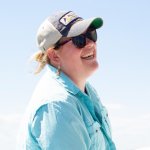Max Suwaki
Los Angeles, California
Max is the founder of itisOVERDUE, a small nonprofit leading trash cleanups in the greater LA area and beyond. Max was born in Japan and graduated from Portland State University, where he studied business administration. Max has been an entrepreneur and environmentalist for his entire life, and he remembers finding his passion for environmentalism at the age of 8, when he visited Germany and was impressed by their eco-friendly practices. He and his “co-pawnder” Leon (a 5-year-old Nova Scotia Duck Tolling Retriever) are very passionate about protecting the environment in their community. In the three years since Max founded itisOVERDUE, the organization has collected 65k lbs of trash. But Max says there’s still plenty to collect, and this cleanup initiative is a lifelong commitment.
This interview was conducted by Ayana Harscoet on June 6, 2023. Press play to listen and find the full audio transcript below the audio player.
Ayana: So first, I want to start by asking a bit more about how you founded your organization. I’ve read stories about how you started picking up trash while walking your dog. And then you started a whole movement. How did that happen?
Max: I was living in an apartment with three roommates and two dogs. We had a good routine of talking about environmental issues at home. We had reusable bags by the door for grocery shopping, and we had different boxes for collecting metal, glass, and paper for recycling.
One day, maybe within a week of moving in, we were walking my dog, Leon. He almost stepped on a needle behind a bush. I could have ignored it, but I didn’t feel like that was something I wanted to do, for him, and also for the community.
I wasn’t trying to be a superhero. It was mainly for Leon. But what if somebody else’s dog got hurt? Or somebody else’s child, or someone wandering off – what could happen?
So, it started with the small intention of me protecting my dog, but as I started talking about it to my roommates, I decided I should start picking up trash because it’s everywhere. And it wasn’t only the needles, but also food related items. We were surprised by the amount of trash that we would see on the street, and we just started cleaning up. And that’s how we started.
Ayana: Wow, thank you for sharing. That’s amazing. So, from then you founded this group?
Max: It wasn’t right away. It’s part of my personality: if I start something, I need to keep doing it. And because dog walking is not something that I can choose, I thought, if I’m walking him anyway, then we can just pick up trash all the time. Then we started doing it every single morning. And that’s how we started that initiative in the beginning.
Ayana: And then, eventually, you founded your organization, itisOVERDUE. In the beginning, how did you decide where to do cleanups or what communities needed the most support?
Max: We started posting on Nextdoor and had one post go viral. We cleaned up the main street of our neighborhood and posted about our huge pile of trash. The next day, eight people showed up. People started telling us which areas needed more cleanup, so that’s how we chose the streets. But now, we know where it’s bad and not as bad, because we’ve looked into the street cleaning map.
But, interestingly, people are not really into neighborhood cleanups as much as river cleanups or beach cleanups. Beach cleanups are the most popular because it’s aesthetically pleasing and fun to be out there. And people can directly see that if they don’t pick up trash, it will hurt the wildlife, the turtles and birds. I think the psychology of it is contributing to how people are attracted to those clean ups more than others.
Ayana: What do you think would be necessary for people to care about the neighborhood cleanups as much as the water cleanups? Why do you think that doesn’t feel as impactful to them?
Max: Especially in LA, it’s not walkable. In Brooklyn and Queens, where I joined other cleanups, their turnout for neighborhood cleanups is really good. I think that’s because it’s walkable and accessible for the people that are that are living in that area.
That being said, one of the places we’ve been cleaning up, called Lake Balboa Park, is very walkable. People come out on Sundays, bike on the bike paths, and walk around. I think that’s the biggest factor, because my neighborhood and many LA streets aren’t walkable. There’s sidewalks, but nobody walks because there’s no metro. The infrastructure is not there and people aren’t going out with their friends, unless you live in downtown LA. Outside of downtown, you have to drive. Then, when you’re driving, you don’t see any trash because you’re on the road. I think that’s a huge factor.
Ayana: That makes a lot of sense. If people can’t walk there, they’re probably not going to want to do cleanups there.
Max: And we collect data every time we pick up trash. We found out there’s a pattern between renters and property owners. Apartment buildings tend to have more trash around them than houses that are owned by individuals. People care a little less when it comes to their apartment complex, because people are just renting. That’s something we found out from collecting data over the past 3 years.
Ayana: That’s a good explanation. I’m also curious, who joins the cleanups? Are the volunteers from all over LA? Or do you find that it’s people from specific communities? Are there any communities where you find it’s hard to get people involved?
Max: We’re fortunate that we haven’t had any problem having volunteers come out. But we tend to see people who didn’t grow up in LA. People from New York, Minnesota, Seattle, anywhere but LA. We only have a few regular volunteers that grew up in LA.
Ayana: Why do you think so?
Max: I think part of it is the way people grew up. LA is just so busy, and it feels focused on money and success because of Hollywood and the media industry. We have close friends who grew up in LA who come out too, but they always say, “I’ve never had a community like this.”
And when they do find a group that cares about community cleanup, it’s usually an organization that they can’t really relate to, like a group intended for retired people. For young people that are looking for a community to belong to, that might not be a group they want to join.
It’s sad that we’re separated by age. I like hanging out with grandmas and grandpas, and I have friends who are in their forties or fifties – some of my best friends. Personally, age doesn’t matter to me too much, but of course, other people my age want to join a group where they can hang out with other young people. It’s not just a cleanup organization, it’s a community where people can share their passion for environmentalism.
Ayana: It’s very powerful to build a group of young people. I’m curious to hear more about the educational side of your community building. Do you touch on topics like environmental justice?
Max: Our organization has 3 components: cleanup, where we host regular community events; the river project – we’ve been working so hard, but it’s a difficult, difficult project – and education. We go to classrooms, tutoring centers, universities, etc. Education is something we really care about, especially because people in college or high school will enter the workforce soon. We want to set an example for educating students in a friendly manner.
One of the student leaders we work with was inspired by our initiative, and they came up with a smart trash station, and NASA invited them to come to the Kennedy Space Center. Education is something we take pride in to make sure that students are educating their peers, and we are educating and inspiring those kids.
We’re going to launch an ecotour in Colombia, where we’ll do a river cleanup and beach cleanup and learn about the coffee farms. Different countries have different initiatives and their own ways to handle these situations, and maybe different ideas about what is a problem. Something we think of as trash, someone else might think of as something to reuse for years and years.
Ayana: Sounds like you’re thinking both locally and globally as an organization, which is very cool. I noticed there was some hesitation earlier around talking about your river program and your relationship with the city. I’m curious what kinds of challenges you’ve been running into, if you feel comfortable speaking to that.
Max: The current government officials aren’t really into our project. Our project is to install a trash boom in the concrete area of the LA River, because the LA River is a manmade river built after flooding in the 1950s.
But some parts have nature, like Lake Balboa Park, a greenspace that connects to the LA River. We saw this turtle peeking out of the water, but it couldn’t dive in anymore because it was basically swimming in plastic and styrofoam.
And that’s one of the reasons we decided to start this project almost a year and a half ago. Before then we were just doing cleanups, and then we decided we needed to take further action to get more help from the government and other community organizations.
But as we started researching, people would tell to go talk to someone else, and we would go talk to them, and that person would tell us to talk to another person, and it just kept going, going, going. And I thought, no wonder nothing is getting done in this area, even though it’s only 10 miles away from downtown LA.
Ayana: Do you feel like it’s not a priority, or has there been resistance to your project?
Max: Resistance. We talked to a bigger organization, too, but every time we try to push this through, people are against it. They say they don’t want to create a flood hazard. But our trash boom is designed to be releasable, so during a flood, it would be auto-released. A student at USC came up with a 50-page research report, approved by a professor and everything. And it’s releasable – that was one of the requirements. Those students came up with it, and we submitted that report, but that wasn’t enough.
Ayana: Do you think flood hazard is the biggest concern, or are there any other roadblocks to this project?
Max: Budget. And they’re afraid we might ditch them. We say we’ll install and maintain the boom, but they’re worried they’ll have to be the ones maintaining it. But I’m wondering, how was the LA River created without any trash maintenance or collection system in place? There’s a huge bike path system, but no trash cans in that area. Why are there no trash cans across a 20-mile area of bike paths?
They don’t want to listen to us because we are younger. They think young people change their minds all the time and we don’t care to see things through.
Ayana: What’s your plan? How do you think you’re going to try and get around that obstacle?
Max: We need to keep pushing for it. And we need to be strong in that position. We need this to happen because birds, turtles, and other wildlife are dying because of trash caught in the natural preserves. People kayak in that. It’s a hazard. People dump all sorts of trash there. It’s not safe.
Ayana: How do you think you’re going to build that power? Have you collaborated with any other groups?
Max: Other organizations don’t really want to collaborate on this particular project because they know it’s a headache. The jurisdiction is really complicated – four people own this river. So you need to clear it with every single one. You think one governmental office is hard? Well, there’s four. It’s very complicated. And all of them need to come to an agreement on their own, and only then they will give us the “go.”
But we have an ocean cleanup in Ballona Creek, not too far from LA. Something like that is already in place, not in the river, but on the bay. So hopefully in a year, maybe a year and a half, they’ll start listening to us.
Ayana: You’re envisioning so much, but you’re also dealing with so much. What keeps you going? And do you have any advice for people who are facing similar struggles?
Max: I like what I’m doing, and as long as you have the passion, you can get through any obstacles. Even the government officials. It is difficult, especially if you’re a nonprofit – it’s really tiring. Managing volunteers to organizing events to people not taking you seriously as a nonprofit. But as long as somebody is showing up, somebody is supporting you, I think you can do it. As long as you have the passion, something’s going to change sooner or later. It might take a little while, but I’m very grateful for my community.







